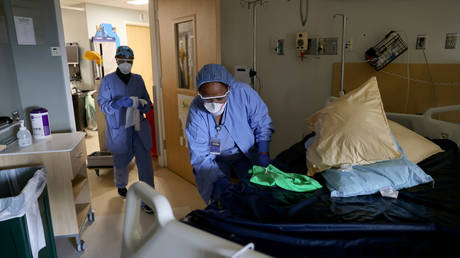
White House health advisor is ‘confident’ there are only weeks until Omicron hits its peak
Dr. Anthony Fauci said that he is as “confident as you can be” that Omicron cases in the US will hit their peak in mid-February, though he acknowledged in an ABC interview on Sunday that “you never want to be overconfident when you’re dealing with this virus.”
Fauci has been one of the lead advocates for Covid-19 vaccinations and boosters, but he admitted that varying vaccination rates across the country will not significantly affect Omicron infection rates in the US. Some areas, however, may face “a bit more pain and suffering with hospitalizations in those areas of the country that have not been fully vaccinated or have not gotten boosters.”
Fauci claimed his prediction is based on data from other nations like Israel, South Africa, and the UK. “They’ve peaked and [are]starting to come down rather sharply,” the health official said, predicting a turnaround soon across the US.
Health officials have stressed that vaccinations can prevent more serious side effects from Omicron. Once cases are below a certain “area of control,” Fauci said, Covid could be “essentially integrated into the general respiratory infections that we have learned to live with.”
Fauci’s constant presence during the Covid pandemic has led to a sharp divide in public opinion, with the controversial health official polling low outside of Democrats, similar to President Joe Biden. Fauci riled up his critics once more on Sunday, again suggesting multiple booster shots on top of people’s original vaccinations.
The infectious disease expert said the exact “durability” of a third mRNA booster or a “second shot boost” of the Johnson & Johnson vaccine is unknown, but he claims a “third shot boost” will be able to have more durability and “protection against severe disease” thanks to data collected from the first boosters.
“We may need to boost again. That’s entirely conceivable,” Fauci said, insisting he does not want a situation where people are made to get booster shots every six months, instead relying on more durable boosters to last longer periods of time.




